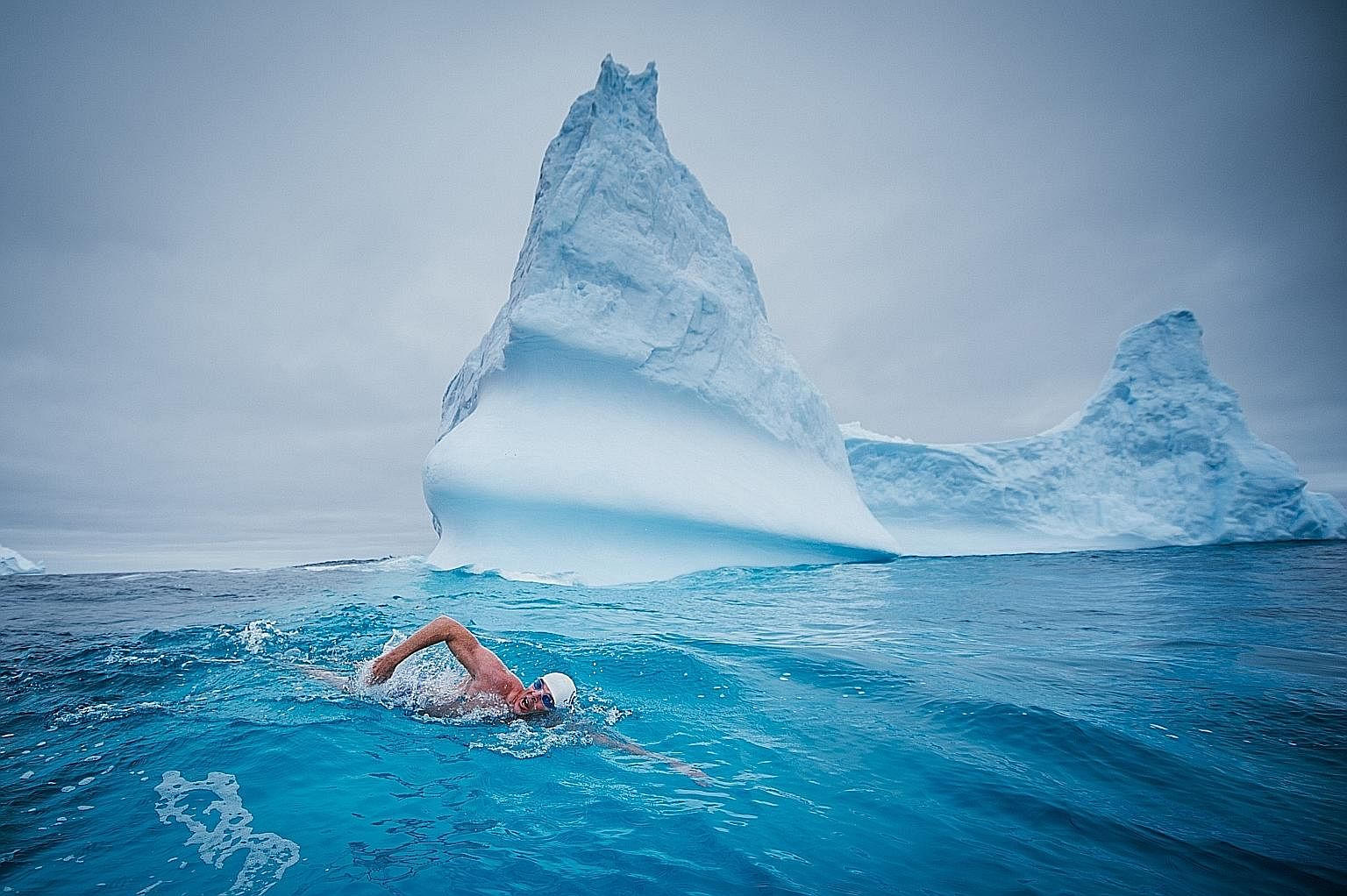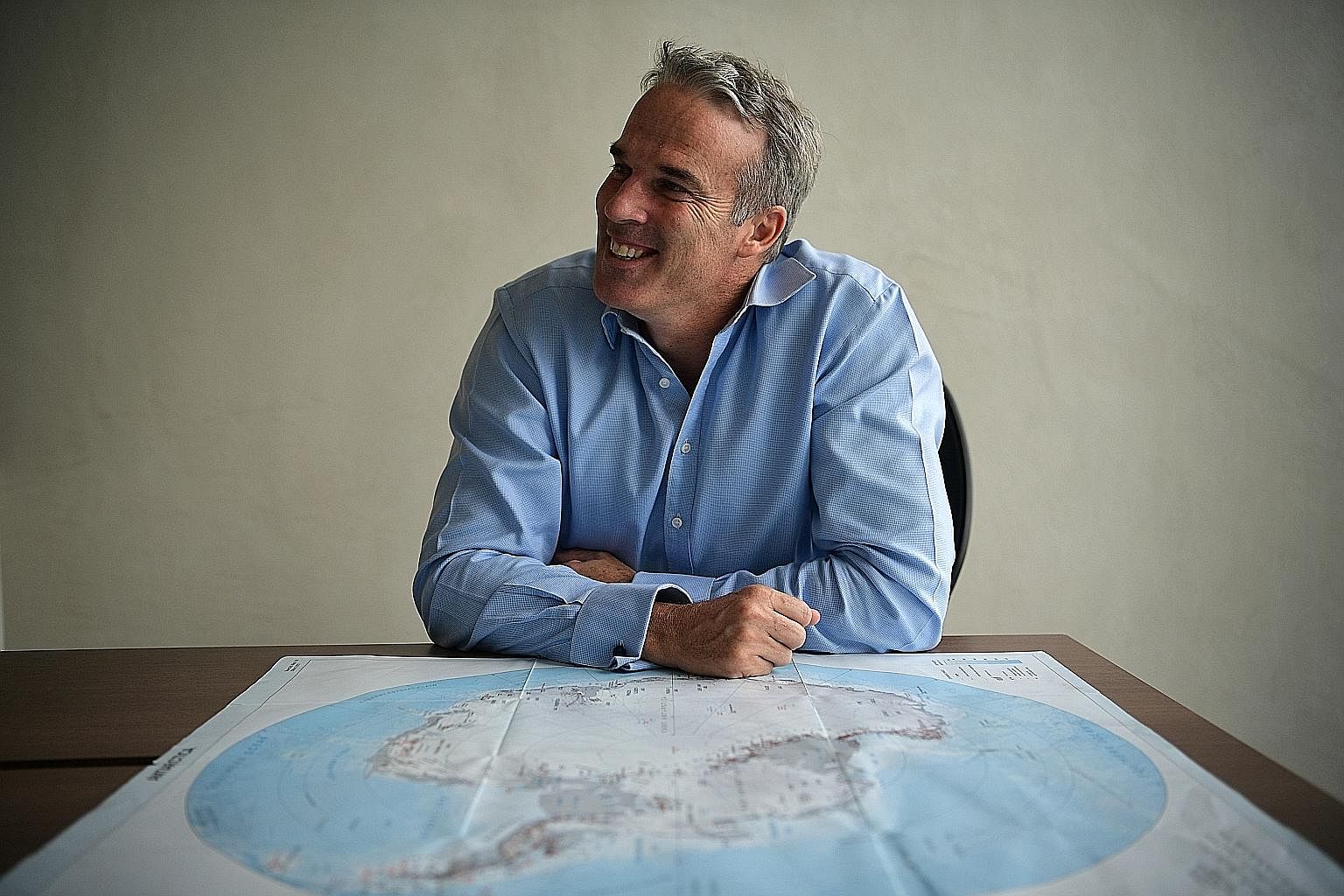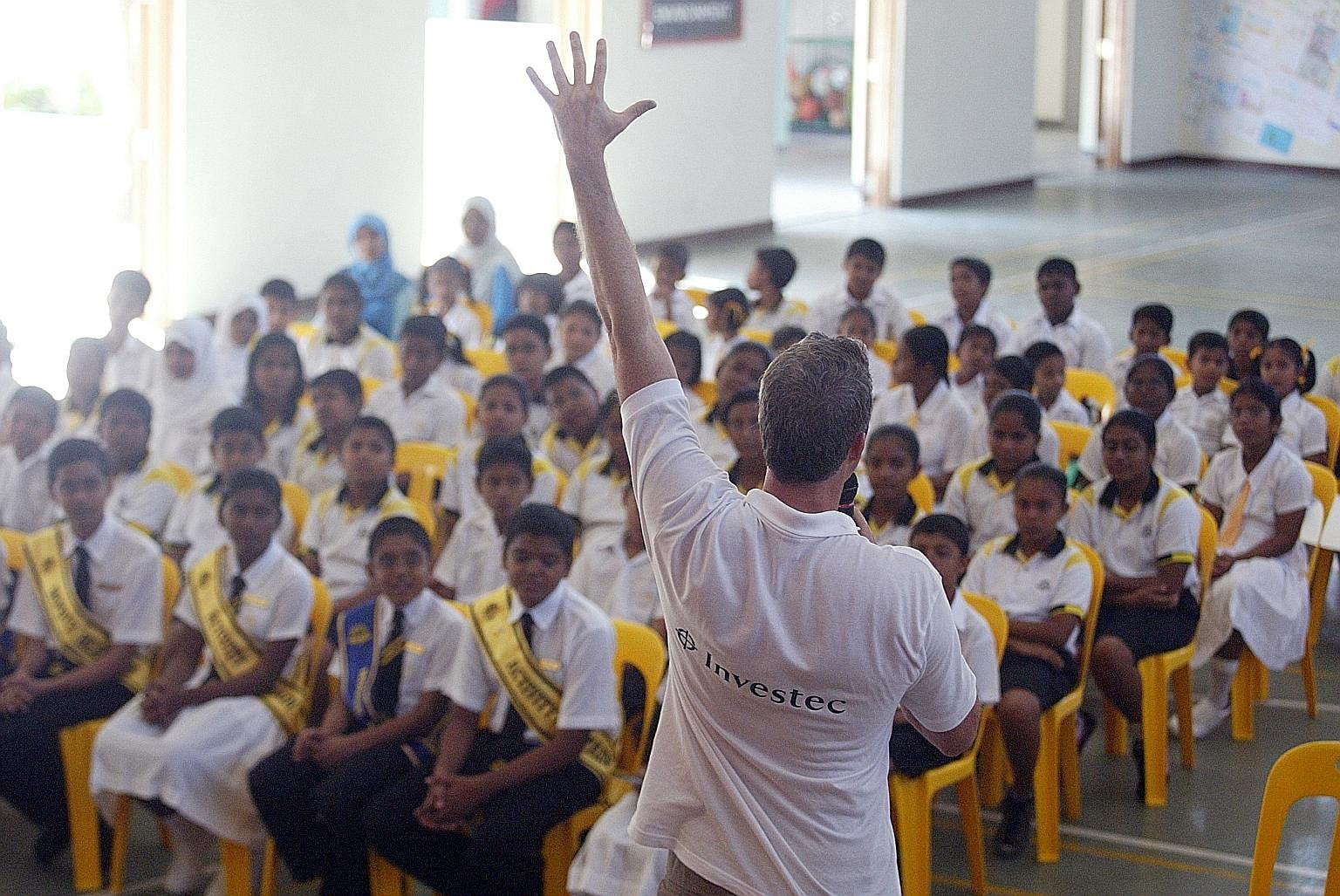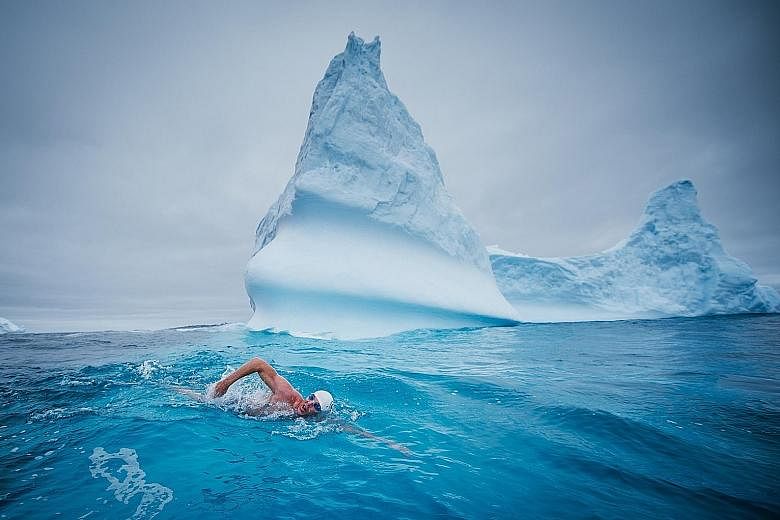The tall brawny man with the intense eyes and salt-and-pepper hair strolls in, his presence filling up the small meeting room at the Park Hotel Alexandra.
"So you interview criminals," says Mr Lewis Pugh, with a mischievous grin hovering about his lips.
He has obviously done his homework and found out that I have authored two volumes of interviews with lawbreakers and felons doing time at Changi Prison.
Alacrity eluded me then but I should have retorted: "And champions and heroes too."
For Mr Pugh is a hero to the oceans, hell-bent on arresting their degradation by humans, lobbying for marine protected areas and tackling climate change.
The 47-year-old is not taking the easy route, oh no siree. Risking life and limb in nothing more than his swimming cap, goggles and Speedos, he is the first man to complete a long-distance swim in every ocean of the world.

In 2010, he nearly drowned as he battled air sickness and freezing temperatures swimming across Pumori Lake, 5,300m up the Khumbu Glacier in Mount Everest.
The British-born environmental campaigner, who spent his formative years in South Africa and whose father was a surgeon rear-admiral in the Royal Navy, says: "Every generation will face its issues. In my father's time, it was the Nazis. For Nelson Mandela and Desmond Tutu, it was apartheid.
"And ours is the environment," says Mr Pugh, in town recently for the launch of the new BMW 5 series.
Eyes glinting, the United Nations' only Patron of the Oceans says: "I will stand and fight for this place, whatever the cost."
Personable and charismatic, Mr Pugh has a hybrid accent, a mix of plummy Brit and South African.

The younger of two children, he grew up in Dartmoor.
His father, he says, had one of the largest collections - about 5,000 - of figurines from the Victorian era, ranging from kings and queens, and admirals and generals, to explorers and actors.
A great storyteller, the senior Pugh would often pick up one of these figurines and regale his young son with tales of their exploits and adventures, instilling in the boy a great love for history and geography.

When Mr Pugh was 10, his family moved to South Africa. His life in Cape Town, he says, was idyllic, shielded from the ugliness of apartheid. "I went to a white school, lived in a white suburb and had no black friends. I was living in my own bubble," he says.
His classroom overlooked the Atlantic Ocean.
"One day, I just had the idea that I wanted to swim across Robben Island," he says.
After countless letters to prison officials requesting permission, he finally got the go-ahead to do so on May 1, 1987.
"There were white prison officers at the jetty with their rifles welcoming me. As they walked me down the beach, I saw a group of black political prisoners cleaning kelp from the beach," says Mr Pugh who had his first proper swimming lesson just one month before the big day.
The swim took more than 21/2 hours.
"Nobody told me but they were actually taking bets on how long it would take for me to give up."
The swim meant a lot to him at that time but took on a totally different meaning when he was invited to the island several years later after the end of apartheid.
The tour was led by several former political prisoners. In Mr Mandela's cell, one of the visitors asked what the worst thing about being in the cell was.
"You'd think that it was brutality but a guide said: 'It was whenever the prison wardens brought their children to the island and we could hear them laugh and cry and argue. We'd think about our children, whom we'd see once a year. It brought us unbearable pain."
Mr Pugh pauses, and says: "It was like someone took a knife and rammed it straight into my chest. As a young white South African, I'd walked down that beach in front of them and swam to freedom, having no concept of what they were fighting for or anything about their lives."
He had his political awakening when he enrolled at the University of Cape Town to read law and politics. Many of his lecturers were anti-apartheid campaigners, including judge Albie Sachs who lost his right arm and was blinded in his left eye after a car bomb attack in Mozambique in 1988.
"They were people who were prepared to lose their lives for justice, equality and freedom. That was where I got my sense of right and wrong," says Mr Pugh, who won the undergraduate prize in maritime law and later a scholarship to do his master's in the field at Cambridge.
It was also during his third year in university that he did the first swim across Lake Malawi; he also did the English Channel later that year in 14hr 50min.
"That's the thing about long-distance swimming. You think you are in for 10 hours but you end up doing 15 because weather conditions can change. It toughens you up because the goalposts always shift, and always not in the way you want."
By the time his father died when he was 21, Mr Pugh had done some major swims.
"I held his hand when he was dying and he said: 'You'd probably kill yourself in the sea one day.' Maybe he'll be right," he says with a grin.
After completing his master's at Cambridge, he worked for five years as a maritime lawyer in London. He wasn't passionate about it.
One day, while standing outside St Paul's Cathedral with a close friend, he said: "I really want to go to the Arctic."
His friend said something which changed his life.
"He said: 'Lewis, it's so important that you follow your own dreams in life because if you don't, you will be following someone else's."
And off to the Norwegian Arctic he went, after taking extended leave. "When I arrived there, I was like: 'Wow, this is where I'm meant to be'," says Mr Pugh who cycled from the bottom to the top of Norway.
Not long after, he found himself walking out of a dull party in Mount Cook in New Zealand just before midnight on New Year's Eve.
Under a starlit sky, he gazed at the shadows of the country's highest mountain, before his eyes rested on a statue of a young Sir Edmund Hillary. The Kiwi explorer and Nepali Sherpa mountaineer Tenzing Norgay were the first men to successfully scale Mount Everest.
"He had a rucksack on his back and a walking stick, and he was going up Mount Cook where he did all his training before he attempted Everest. It was the look on his face. He had the courage to follow his dream. There and then, I decided I was not going back to law. I love swimming and I just want to forge my career as a pioneer swimmer," says Mr Pugh, who was then 32.
Not swimming up and down a lane in a pool, he emphasises, but in places where he could see fjords and glaciers and waterfalls.
Like American Lynne Cox and Slovenian Martin Strel, he set his sights on the world's landmarks which had not been attempted by other swimmers.
Martin Strel is famous for swimming the Danube, the Mississippi, the Yangtze and the Amazon, Lynne Cox was the first to swim the Straits of Magellan and around the Cape of Good Hope.
"Because I started a little later than them, I got left with all the f***ing cold places," he says, letting rip an expletive with a bellow.
From 2003 to 2007, he completed nearly 20 amazing swims. These include a 204km one down Norway's Sognefjord, the longest unfrozen fjord in the world, in 21 days; and the most southerly long-distance swim at Petermann Island, Antarctica.
He also became the first person to complete the Holy Grail of swimming, by doing a long-distance swim in every ocean of the world in 2006. He candidly admits that it was all about being the first initially. The tipping point came when he swam at Deception Island in the Antarctica in 2005.
"On the beach was an old Norwegian whaling station with vats which they used to store whale blubber. Just 100 metres into the swim, I saw thousands of whale bones everywhere. Some were piled so high, they were almost on the surface of the water. The whaling fleets had decimated the whale population in the area."
The swim across the whale graveyard galvanised him into action.
The best way to tell the world how their actions are destroying the oceans, he decided, was to swim in vulnerable ecosystems.
"If the ice caps were melting and I did a swim in an open patch in the North Pole, people would really sit up and take note," he says.
So he set that plan into motion. But all the doctors he interviewed told him it was suicidal to swim in minus 1.7 deg C water, the coldest seawater can be before it freezes. But famous South African sports scientist Tim Noakes agreed to join his team. To train for that expedition, a swimming pool was built in Cape Town and filled with ice.
Mr Pugh started doing a kilometre in 12 deg C water. The temperature was lowered in subsequent sessions until it hit 2 deg C. In comparison, the average temperature of an indoor swimming pool here is about 30 deg C.
By accident, Prof Noakes discovered Pugh has the unique ability to elevate his core body temperature while psyching himself to jump into cold waters, a process he calls "anticipatory thermogenesis".
The swimmer chalks it down to his experience in swimming in cold waters, and also fear. "Each time you swim in the Arctic or Antarctica, you have weather which can kill you or predators - walruses, leopard seals, killer whales."
In 2007, he did his 1km swim across the North Pole to highlight the impact of melting ice; it took him 18min 50sec.
Wryly, he says that it took him a few more years to realise it was not enough to draw attention to an issue. "You've got to go in there and demand action," says the author of two books, Achieving The Impossible and 21 Yaks And A Speedo.
In 2015, he did a series of swims off Antarctica to campaign for a marine protected area in the Ross Sea. This included a swim in the Bay of Whales, where the water was not just sub-zero but the air temperature was minus 37 deg C.
In doing so, Mr Pugh achieved the almost impossible; his "Speedo diplomacy" got 24 nations which make up the Commission for the Conservation of Antarctic Marine Living Resources to sign a groundbreaking deal to protect a vast area - 1.57 million sq km - of Antarctica.
"The Ross Sea is one of the last true wilderness areas on earth, with humpback whales, emperor penguins and leopard seals. If you can imagine what the world looked like before man touched it...," says Mr Pugh who has two stepchildren in their 20s, and two adopted girls, aged eight and 10.
Often asked to give talks on his exploits, he says he is not done.
"I'm trying to create seven marine protected areas by 2020," he says, opening up his map to point out the vulnerable seas in the Antarctic area which collectively spans about 7 million sq km, roughly the size of Australia.
Upcoming swims will include a 3km one in another "whale graveyard" around South Georgia, where British sailors slaughtered more than a million whales in the late 19th and early 20th century.
The interview is over. He grins and looks at me.
"So you have met your share of psychotics. Am I one?"
I say: "Yes, but you're a very good one."
WATCH THE VIDEO
Swimming across the North Pole http://str.sg/4h8P


